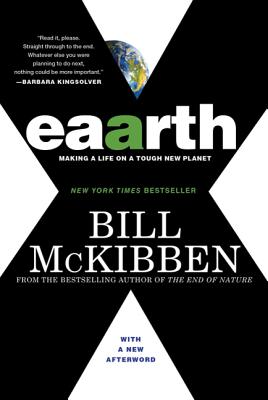 If it were up to me I'd make this book required reading for everyone on the planet. It's one of the most important books ever written about climate change. In fact, the only reason it's not the most important book, is because books written in the 70's and 80's predicting climate change were far more important, though mostly ignored. If we had only listened then, we would need a book like Eaarth now.
If it were up to me I'd make this book required reading for everyone on the planet. It's one of the most important books ever written about climate change. In fact, the only reason it's not the most important book, is because books written in the 70's and 80's predicting climate change were far more important, though mostly ignored. If we had only listened then, we would need a book like Eaarth now.The book starts strong. It caught my attention quickly, citing specific examples of climate change and it's results on both massive and small scales. I thought the reason the United States didn't take much interest in climate change was because those hardest hit by changes in the weather lived in other parts of the world, but the truth is, we've been hit too. The major difference is that American people, supported by the US government, have the money to import food, crank up the AC and even pack up and move if we want. However, at the rate we're going, we're going to reach a point where all the money in the world won't be able to buy you food that just won't grow, or remove the pollution from your water, or save your life when a hurricane crashes into your town.
But the book isn't all doom and gloom. McKibben simply wants to make sure you're listening. He wants you to know that you're not saving your children or your grandchildren anymore, you're saving yourself. He wants you to you fully understand that the planet has been fundamentally changed and it's not ever going to change back. The most we can do is stop things from getting worse. It's a really hard piece of information to swallow.
The second part of the book is more hopeful. McKibben doesn't have all of the answers to survival, but the ideas he has are really good ones. His points are valid. I really liked his idea of communities providing for themselves and looking out for each other. Why buy your electricity from a power plant when you can generate it yourself? There's real security in being able to take care of yourself. When oil starts to dwindle and the prices skyrocket why not power your electric car and your house at the same time with solar and wind power from your own yard? His point is that we can't wait for big government to save us and provide for us, we have to show them what we want. With the world in the state is in right now, bigger is not going to be better. We have to scale down, start taking back the power to care for ourselves.
McKibbon isn't attacking the government. He praises large scale projects like highways and general infrastructure. This country grew and grew and because of that, American people enjoy a fairly high standard of living. It's time to stop growing though. It's time to adapt to the world we created. No book I've yet read makes that more abundantly clear than Eaarth.
It ends on a good note. The kind of ending that makes it easier to recommend this book. He uses Vermont as a model for sustainability, but he talks about larger-scale projects as well; things that are working. He also points out the importance of the internet. The internet, this crazy tool that can connect anyone, anywhere. For example, I'm writing this review while sitting on a bus to NYC. The wireless internet connects me to millions of people, the biggest forum ever known. Any idea I'll ever have can instantly be shared with he world. There is no need for us all to be isolated, we can figure out solutions and move forward as a group. I can instantly find information about powering my own home, growing my own food, and converting my car to run on veggie oil by just getting online. The limitless connections of the internet are a gift when most of us don't even know our own neighbors. It's a hope, in a world where hope fades more and more the longer we live the way we do.
And, in the interest of saving paper, I will gladly loan you my copy.